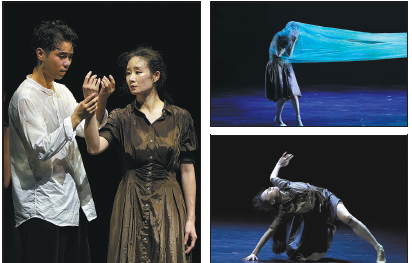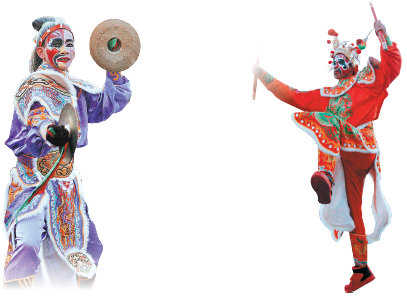LIVE PERFORMANCES BACK IN BUSINESS
Audiences return following optimization of COVID-19 measures
A group of 22 young people gathered at the airport in Shantou, Guangdong province, at 8 am on Jan 22, the first day of Chinese New Year, for a flight to Beijing, more than 2,000 kilometers from their hometown.
That afternoon, they took a four-hour bus journey from the Chinese capital, arriving at their destination, Aranya, a popular coastal resort in Qinhuangdao, Hebei province, just before sunset.
Members of a Yingge dance troupe, the group gave three shows on Jan 23 and 24, with each performance lasting about 20 minutes. This type of dancing is intended to drive away evil spirits and bring good luck and peace.
Yingge dance troupes performing during Spring Festival typically attract large crowds to watch an art form that dates to the Ming Dynasty (1368-1644).
The performers usually hold two short sticks, jump up and down, and sing to powerful rhythms. They also wear makeup to indicate different characters.
Zhang Shaoqun, leader of the troupe, who also performs Yingge dance, said: "It was the first time the troupe had performed in a city in northern China. We started preparing for the shows at 4 am, and the first performance began at 10 am.
"It was very cold outside and the performers wore thin costumes. The audience members were very kind — giving us gloves to keep us warm. It was an unforgettable experience for all of us."
It was also a new experience for audiences to watch Yingge dance, one of the oldest and most popular folk arts in Guangdong, which combines dancing, martial arts and Chinese opera. The visitors clapped, cheered and took photos and videos of the performers.
China celebrated the first Spring Festival since optimizing its COVID-19 control measures.
Zhang said that when a wave of infections led to a sharp decline in the performing arts market, the troupe remained inactive for about three years.
"In addition to Spring Festival, we are hired to give shows for newly opened businesses, such as shopping malls and restaurants. However, all these activities were halted due to the pandemic. Now, our lives are gradually returning to normal, and our shows are returning," Zhang said.
"Since Jan 22, we have given a series of shows. The troupe is fully booked until the end of this month. We are all tired but extremely happy to perform for crowds."
Zhang, 34, who was born in a small village in Shantou, became interested in Yingge dance as a child. He said it is highly popular in his hometown, and because of the "good message that it delivers", his family supported him in learning the art form.
After eight years serving as a soldier nationwide, Zhang joined an established Yingge dance troupe in 2017 after retiring from the army.
The troupe was formed in 1953, and when it was decided to launch a new one to train more young performers, Zhang was made leader of this group.
The new troupe, the Hao Men Yingge Dance Troupe, comprises 36 official members and 36 reserves. With an average age of 20, the youngest member is only 7.
An all-female Yingge dance troupe is now being prepared, and Zhang said that to cater to audience needs, it will perform in a different style to the Hao Men Yingge troupe.
"We have big plans for this year, and we long to offer the universal and collective experience we provided before the pandemic emerged," Zhang said.
Zhou Meng, project manager at Aranya International Culture Development Co's operating center, said the resort has offered Spring Festival entertainment programs since 2016. When the pandemic emerged in early 2020, the company had to cancel all plans made for the holiday.
"During the weeklong Spring Festival vacation this year, we had an average of 15,000 visitors a day, and the numbers reached new highs on Jan 23, 24 and 25 — higher than our peak period during the summer holiday," Zhou Meng said.
Programs staged at the resort ranged from sports and music, to dance and folk arts, with some 200 artists taking part.
"It felt like a full return. I watched the smiling faces of families and friends who came to the resort. It was a very happy moment," Zhou Meng said, adding that plans made by the venue for the coming months include staging a drama festival, screening films, and hosting classical music concerts.
Venues sold out
According to the China Association of Performing Arts, more than 9,400 performances were staged nationwide during the Spring Festival holiday, a year-on-year rise of nearly 41 percent, and up 22.5 percent compared with the Spring Festival break in 2019.
Total revenue from this year's performances was 378 million yuan ($55.7 million), and the shows attracted more than 3.2 million audience members.
A report released by the association on Jan 28 said: "Venues such as the Shanghai Concert Hall, Hunan Grand Theater and Shenzhen Concert Hall staged classical music concerts, which sold out. Traditional performances, such as Peking Opera, Kunqu Opera, Qinqiang Opera and Pingju Opera, were among the bestselling shows during Spring Festival.
"At smaller theaters, musicals, immersive shows and standup comedians dominated the box office."
Dancer-choreographer Wang Yabin said: "Live performing arts are all about being close to other people. For us performers, audience participation is part of our act."
Last year, Wang choreographed a new dance drama, The Lady from the Sea, based on the play written by Norwegian playwright Henrik Ibsen in 1888. Wang performed the lead role of Ellida, a woman who has a peaceful life on the surface, but who has to make choices based on her love, desire, confusion, struggle and self-awakening.
Commissioned by the Shanghai International Dance Center Theater, the production premiered in Shanghai in November, and was scheduled to be staged in Beijing in December.
However, the performances in the Chinese capital had to be postponed due to the pandemic. Wang is now ready to stage the production at Tianqiao Performing Arts Center in Beijing on Feb 18, before she heads to Lucerne Theater in Switzerland to choreograph a new dance show with local artists.
"During the pandemic, I spent a lot of time working from home, like many other people. I have a small space with a mirror and a ballet balancing bar, where I can train every day," Wang said.
She added that it takes a long time to transform a production from the page to the stage, and this complex process requires cooperation from many artists.
"I created The Lady from the Sea by meeting other members of the creative team and the dancers online, which was extremely challenging. Our schedules were changed repeatedly, but now we are all looking forward to the return of live performances," Wang said.
As China has optimized its COVID-19 measures, she plans to resume her project, Wang Yabin and her Friends, which calls for international collaboration.
Wang collaborated with Belgian choreographer Sidi Larbi Cherkaoui on a production of Genesis in 2013, and the following year with choreographer Elizabeth Roxas-Dobrish from the Alvin Ailey American Dance Theater in New York on Dream in Three Episodes.
"This year, I will work with French composer Laurent Petitgirard on a new dance piece based on the classic Chinese novel Journey to the West. I met him three years ago when I toured France, and he told me he was very interested in this production. We've been in touch and talked about the project for a long time. Now, it's happening," she said.
Popular destination
During the Spring Festival holiday, 308 million domestic visits were made by tourists, a rise of just over 23 percent year-on-year, and 88.6 percent of the level reached in 2019.
According to the China Association of Performing Arts, some 3,300 performances were staged at tour sites during the holiday, producing total revenue of 193 million yuan and audiences of about 2 million.
Chengdu, capital of Sichuan province, was one of the most popular destinations during Spring Festival. Every night during the holiday, concerts, standup acts and folk arts were staged in Wide and Narrow Alleys in the city center, which boasts a mix of historical areas and modern commerce.
Xi'an, capital of Shaanxi province, also saw a large number of visitors during the holiday.
Huaqing Palace, one of the city's most popular tourist sites, was the setting for an outdoor show, Song of Everlasting Regret, based on Tang Dynasty (618-907) poet Bai Juyi's eponymous work. The three shows a day attracted a total audience of about 430,000.
In Jiangsu province, the Jiulongkou Scenic Area in Jianhu county attracted 420,000 visitors from Jan 23-27, a rise of 16.7 percent year-on-year. Nine outdoor and indoor performances of Jiulong Immersive, a multidimensional Huaiju Opera show, were staged in the scenic area each day.
Nine sites in this area, including an old arched bridge, a traditional Chinese pavilion, a teahouse and a small bay, were transformed into performance areas.
Featuring buildings from the late Ming Dynasty and the Qing Dynasty (1644-1911), centuries-old trees and fish-filled waters, visitors strolled through the area's narrow stone-paved lanes to watch live outdoor performances and interact with the artists.
Huaiju Opera, which dates to the Qing Dynasty, combines singing in the Jianhu dialect with dancing. It rose to popularity in Jiangsu and Shanghai in the 1950s.
Director Gao Yan, who worked in 2021 and last year with Huaiju Opera performers, choreographers, acrobats and multimedia artists to create the show, said, "We spent a long time on this large show, and we planned to stage it regularly in the scenic area, but the production was postponed due to the pandemic.
"We premiered the show during the National Day holiday in October. Although audience feedback was good, we still had no idea when we could stage the show regularly.
"Now, in view of audience numbers and good reviews during Spring Festival, we are proceeding as planned, but we will make some adjustments to details to improve the show."
Indoor venues have faced many challenges during the pandemic, particularly from social distancing.
Deng Wei, producer at Star Theater, one of the most popular small theaters in Beijing, said, "We couldn't wait for audience members to sit side-by-side in the theater again, and when they were allowed to do so, we welcomed them at the front door."
The privately owned Star Theater survived the pandemic, but like many others, it reduced the number of performances during this time — affecting its income heavily.
Following the introduction of optimized pandemic prevention and control measures, theaters have reopened. During the three-day holiday to mark the start of 2023, a total of 77 theaters in Beijing staged 352 performances.
Deng said, "We staged The Desperate Love, one of our bestselling plays, which was written in 2013, during Spring Festival, and it sold out immediately.
"On the day the theater reopened, I stood on the second floor watching the front door, where crowds were waiting for the show to start. This scene really touched me."
Deng, who has worked at the theater for five years, added, "As there were no seats available, I watched the entire play by standing at the back of the theater."
chennan@chinadaily.com.cn

















